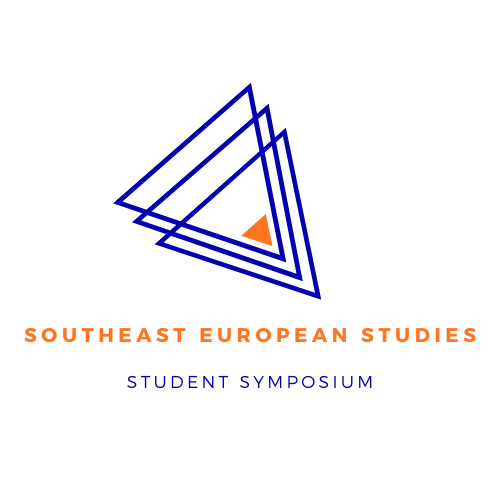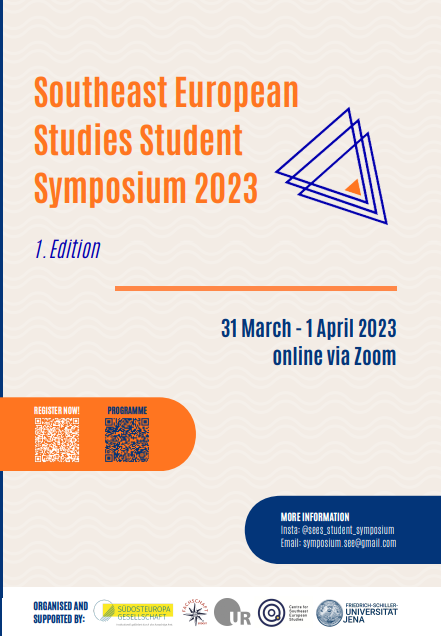The Symposium kicked off on Friday morning with a presentation by Pauline Haak (Jena) titled “The Optimists. Family, Violence and Marginality in Migration Narratives of Romanian Women”. Pauline’s bachelor’s thesis research focuses on the perspectives of Romanian migrant women from marginalized socio-economic backgrounds in Halle, Germany. Through interviews, she was able to examine these women’s experiences of intersectional discrimination in Germany.
The second panel started with Julia Leimeister (Fulda) presenting her current Bachelor thesis project on “The Not-Diaspora”, or the Romanian diaspora in Germany. Focusing on the research question “what are the social mechanisms behind Romanians’ disappointment in their diasporic community?”, Julia provided an in-depth analysis of the self-construction of the Romanian diaspora in Germany and its “In- and Out Groups”, thereby observing that there is no perception of a closely-knitted, collaborating Romanian diaspora in Germany. The second panellist was Erza Plava (Jena). During the presentation of her master’s project “The Kosovo Albanian Diasporas Impact on the Kosovo Conflict”, the role of the diaspora as peacemaker vs. peacewrecker was discussed in the theoretical framework of international relations. The main focus was therefore on the Kosovo Albanian diaspora in the three main centres of that time: Germany, Switzerland, and the USA.
In Room 2, the first panel opened with a presentation by Laura Schatz (Graz) named “Gender and Ethnicity in EU Enlargement Policy. An Intersectional Analysis of IPA II Funding in North Macedonia”. This is the result of ongoing research for her master’s thesis. By analysing policy documents and complementing the analysis with 18 semi-structured interviews, Laura identified a lack of transparency in IPA funding structures and an overall lack of intersectionality. Furthermore, Sonja Stojadinović (Graz) discussed her research on “Chinese and EU conditionalities in investments in the Western Balkans: Similarities and Differences“. To analyse the description of Chinese presence’s rise in infrastructure investments in Croatia, Greece, North Macedonia and Serbia, she examines academic sources regarding Chinese and EU infrastructure investments in the Western Balkans, mainly in the form of loans and grants.
The second panel started with a presentation by Grégoire Soria-Metais (Brussels), on “Business and State Capture in Serbia’s Media Environment: A Strategy for Capturing the Fourth Power“. Grégoire introduced the phenomenon of ‘state capture’ as the reason for politicised media in Serbia. He then focused on conceptualising a new variant of state capture in Serbia, in which actors are less focused on enriching themselves. The second presentation, held by Sophia Freidhoff (Regensburg), focused on “The Political Instrumentalization of the Romanian Revolution in 1989 in the Media”. Working on the influence of “telerevolution”, Sophia analyses up to 500 video resources in Romanian from the archive of the state broadcaster TVR from December 22 to December 31, 1989. Further analysis is set to focus on newspaper articles.
Workshop 1: “Working with Wikipedia. The Free Encyclopaedia and the Humanities” (Zurich). The workshop began asking what the participants’ experiences with Wikipedia are and for what do they use the platform. Afterwards, the participants were presented with facts about Wikipedia. In the further course of the workshop, two strands of criticism on Wikipedia (conservatives and progressives) were discussed, including as factual errors and political bias/tendency. Afterwards, the participants were introduced to the central principles of Wikipedia and finally indicated how to edit articles in Wikipedia.
Workshop 2: “Reading Methods for Academic Texts on Roma in Southeast Europe” (Jena). Startingly, the participants were shown pictures to raise awareness of the participant’s biases. Ben Orendt then introduced the terms of ‘race’ and ‘ethnicity’ and explained how they should be considered as a category when writing about the Roma minority as the term helps unveiling processes of racism and discrimination. The final part of the workshop consisted in analysing and discussing text excerpts by different authors to determine how the concepts ‘race’ and ‘ethnicity’ were applied.
Workshop 3: “Writing about Southeast Europe. Cliches, Creativity and Responsibility” (Lea Horvat and Ana Sekulić, Women* Write the Balkans (WWTB)). After a short introduction on the topic, participants analysed and reflected on possible biases, positionality, and characteristics of writing about the Balkans by focusing on four excerpts. The workshop’s participants then discussed their impressions in groups. In a second task, the participants were given 10 minutes to write about their relation to and perception of the Balkans freely and individually. These texts were not disclosed but the participants were asked to express the feelings they experienced while writing them with the group.
The second day of the Symposium started with a presentation by Johannes Nüßer (Regensburg) on his current master thesis project “The Environmental Consequences of Building the Hydro Power Plant Iron Gates/ Djerdap/ Porţile de Fier from Romanian and Yugoslav Perspectives”. In his research, the newspaper Politika and România Libera are analysed for similarities and differences in reporting on the Hydro Power Plant. Furthermore, Eleftheria Tanka (Nicosia) talked about “The content of the Set of Ideas of Boutros-Boutros Ghali and of the Annan Plan and the internal political circumstances that influenced the attitudes of the Greek Cypriots” and presented the two plans for Cyprus and their reception on the island. The main focus of the presentation was the development of the hypothesis that the internal political circumstances led the Greek Cypriot community to reject both plans.
The second panel was opened by Simon Campbell (Belgrade/Graz) presenting his current research on “How railway infrastructure at Serbia’s northern borders enfolds affective relationships of mobility and racialisation for people-on-the-move”. Describing the current situation at the EU’s external borders (border violence and pushbacks), Simon linked the current railway routes to deportation trains from the past during WWII (camps, prisoners etc.) and to slavery and imperialism. Afterwards, Elpida Vlaidiki (Piraeus), presented her research on “Management of the Education for Syrian Refugee Children in Turkey since 2011: the Role of the EU and the UN”. Through a multilevel governance approach and by using databases of the Ministry of National Education Turkey, the World Bank, the EU, and UNHCR, Elpida identifies three phases of education policies in Turkey for Syrian refugee children. By analysing qualitative and quantitative data through a comparative approach, she builds on the hypothesis that the contribution of major international organisations is crucial in managing education for refugees.
In his presentation on the soon-to-be-published monograph “Censorship of Translated Literature in Totalitarian Albania. Case: “Robinson Crusoe””, Ledio Hala (Munich) examines several Albanian-language versions of Robinson Crusoe as an example for censorship in totalitarian states. The presentation included an introduction to the concepts of ‘ideological atheism’ vs ‘western atheism’ and the Soviet publication criteria system, Glawlit.
Workshop: “Science blogging Opportunities and Challenges of Open Science for Young Researchers in the Humanities” (Thomas Schad, Berlin). After discussing the definition of open science and the field’s history, Schad shared his experiences in science blogging. Furthermore, the guest trainer Vincent Vaessen exhibited the structuring and publishing of a blog entry.
In the networking meeting, we managed to connect with other participants by answering questions about our studies and the region in breakout rooms. We first opened the session with some warm-up games and then discussed topics related to Southeast Europe in breakout sessions, which helped participants connect with others in a more informal way.
Keynote: “From Popular Uprisings to Electoral Campaigns: Affective Politics of Anti-Government Alliances and Protests under Turkey’s Authoritarian Transformation” (Derya Özkaya, Graz). Building on multi-sited ethnography, Derya Özkaya elaborated on the transformative potential and the challenges posed by the affective constellation conjured up in different protest events against Turkey’s authoritarian regime. Despite this quite gloomy topic, the focus on ‘hope’ as an emotion with a potential for positive change brought the Symposium to a wholesome end.
Overall, the first edition of the SEES Student Symposium successfully fulfilled its promise of connecting students interested in Southeast Europe. The presentations and the productive discussions that ensued, as well as the input from workshops and keynotes led to new thought-provoking insights and new connections with lovely people all over Europe.
Weiterführende Literatur:
Bercken, William van den: Ideology and Atheism in the Soviet Union, Berlin, Boston 1988
Charim, Isolde and Auer Borea, Gertraud: Lebensmodell Diaspora: Über moderne Nomaden, Bielefeld 2012
Menga Filippo: Building a nation through a dam: the case of Rogun in Tajikistan, 2014, https://doi.org/10.1080/00905992.2014.924489
Yıldız, Can and Genova, Nicholas De: Un/Free mobility: Roma migrants in the European Union, 2018, https://doi.org/10.1080/13504630.2017.1335819

